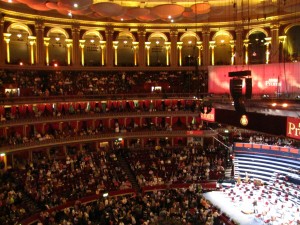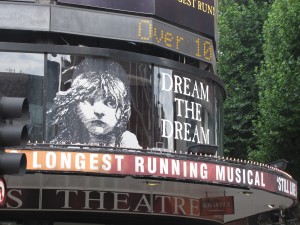… So far.
During the two weeks in London, I have so far had the opportunity to see a variety of shows, which have offered different perspectives of theatre culture in England.
First, there was The Merry Wives of Windsor at The Globe. As a groundling after a long day exploring the city, my feet were exhausted by my excitement levels were through the sky (well, higher than usual, as they tend to be at somewhat extreme heights in general). Seeing Shakespeare performed at The Globe was an incredible experience for many reasons. Not only was the performance one of the best live productions that I have seen, the theatre’s atmosphere was almost indescribable. It was almost if everyone had traveled to the turn of the 17th century. Usually, everyone is quiet during the performance and politely respectful of the performers. While this was the case, the audience seemed more willing to shout, cheer, and laugh uncontrollably at the events on stage. Being so close to the stage, the magic of the actors radiated from the stage and created an atmosphere unmatched by any performance thus far. The added music also added to the atmosphere- an Early Modern theatrical experience would have had the pre-show performers and would have been completely different from what we are used to. The performance was as close to replicating that experience as possible in our modern world. Afterwards, we were able to thank some of the actors and they seemed sincerely grateful that we said something- an idea that would be challenged later.
Next came the Proms at Royal Albert Hall. While The Globe was magical, Proms was one of the most equalizing of the performances because of how accessible they were. In the States, every classical concert I have been to has been a stuffy affair. There, the celebration of the music was open and everyone seemed to be unified in their desire for good music (which the audience should not have been disappointed with). The biggest issue I had with the Proms was the incessant coughing. Usually people try to hold their coughs, but when one or two people cough at during movements, it doesn’t provide an excuse for everyone to cough uncontrollably to prove they can and that they are not going to do disrespect the musicians by coughing during the performance. I would like to go back to Proms to see if it is a bizarre tradition or if that night was a fluke.
My following experience was Billy Elliot, which I have already blogged about, so I’ll try not to be redundant here. Other than being my first big West End experience, it was also important because it showed a lot of the themes of our course in a new light. Instead of applying the themes to the immigrant communities, it showed the themes in terms of a distinctively native English story. Furthermore, it also highlighted two differences between English and American theatre in particular. Firstly, we aren’t used to paying for our programs in the States. As an avid theatre goer, I’m used to being handed a Playbill (or regional equivalent) and continuing into the theatre. I don’t have to wonder who the cute guy playing a certain character is or why so and so looks so familiar. I don’t mind paying an extra three quid when I’m paying half of what I’m used to paying, but it definitely caught me off guard. Secondly, the tradition of stage door here is (as far as I’ve gathered) practically non-existent. In NYC, it is fairly common to wait after the show at the stage door to thank the actors for their performance, get an autograph, and if you are lucky, a photograph. (Yes, this can be a weird experience, but it can also be a great one.) When we went after Billy, it was completely different. While there were people there, the actors went by ignoring everyone. After Holly mentioned it, I realized that this was indeed a representation of the English concern for privacy and social dis-ease. On stage, the actors are free from interacting with the strangers feet away from them. At the door, they are in a different type of spotlight. Yet, the boundaries between personal and private life would not intersect. They are still technically at work. The guys from The Globe seemed to enjoy that we acknowledged them. I can’t wait to try another stage door experience to see the difference. (I planned to try again after Les Mis, but it was raining…)
Next came Bedlam, back at The Globe. For the first play by a woman performed there, the show was interesting. I’d like to say it succeeded it my expectations (which weren’t that high), but it didn’t. It did meet them, but something about the show was lacking the magic of the first show we saw there. At the end of the first act, I wasn’t at all satisfied, but by the end of the second, it had redeemed itself. I’d like to blame this all on not being a groundling and therefore surrounded by the audience members and the actors. I did enjoy it but it was not my favorite by any stretch.
Lastly (thus far) is Les Miserables. One of my favorite musicals, I thoroughly enjoyed it. Despite the fact Marius has a slight bald patch, the actors were outstanding. (Even Norm Lewis, who I have seen in another musical and was THOROUGHLY disappointed in then, was outstanding. His awkward- but commanding- stage presence was perfect for Javert.) A truly equalizing musical, I was not surprised to see people in blue jeans and others in formal dresses. The difference is interesting when considered in the context of the musical and its equalizing themes. Theatre in London is truly for everyone- no matter one’s status. Seeing the opposites in dress at this show hit me as strangely appropriate. (I don’t want to elaborate knowing that some of you guys have yet to see it. So, I’ll just leave it at that.)
So far, I’ve thoroughly enjoyed my experiences at the theatre and can’t wait for more. I’m hoping to see Wicked (my favorite, in case you have missed that slight detail) and Blood Brothers at the very least. While technically not theatrical, I also expect my experiences at the various football matches I’m planning on going to to be worthy of a theatre stage!






